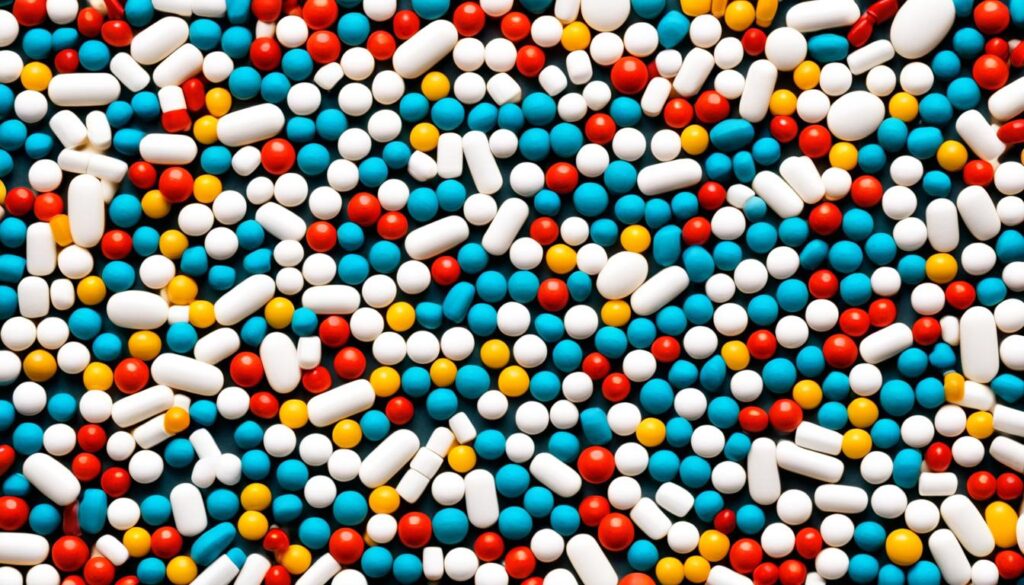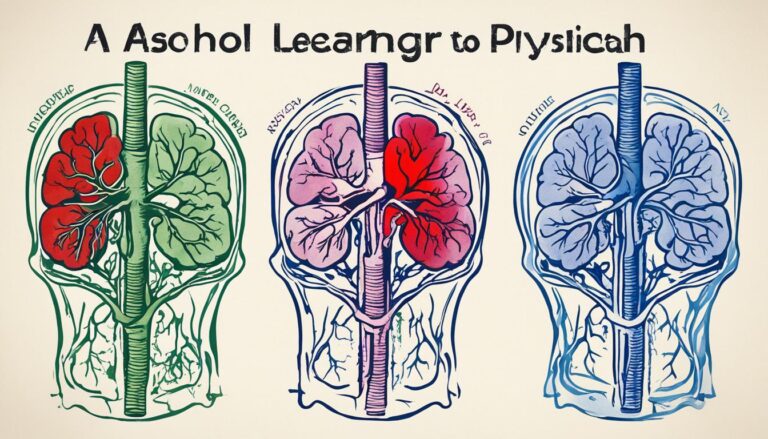Alcohol Dependency, also known as Alcohol Use Disorder (AUD), is a big public health issue. It affects about 15.1 million adults in the United States. This condition makes it hard to control or stop drinking, even when it harms health and relationships.
The National Institute on Alcohol Abuse and Alcoholism says excessive alcohol use is any pattern that harms well-being. This includes binge drinking, which hits about 25% of U.S. adults. It’s vital to know the causes, symptoms, and treatment options for recovery and prevention.
This article will look into these areas. It uses data and studies to show how common and serious alcohol addiction is.
Key Takeaways
- About 15.1 million adults in the U.S. are affected by Alcohol Use Disorder.
- Alcohol is the third leading preventable cause of death, with 88,000 deaths annually linked to its misuse.
- Approximately 14.4 million adults struggle with alcohol use problems without other substance disorders.
- Alcohol use disorder significantly raises the risk of various health complications, including liver disease and mental health challenges.
- Effective treatment can include medications and behavioral therapies, yet many do not receive help.
Understanding Alcohol Dependency
Alcohol dependency is a serious condition where people can’t control how much they drink. It causes a lot of distress and makes it hard for them to function. It ranges from casual drinking to severe alcohol use disorder (AUD). Knowing this range helps us see who needs help.
About 28.8 million adults in the U.S. had alcohol use disorder in 2021. This is a big problem. Among teens aged 12 to 17, around 753,000 were also struggling with it. Starting to drink young increases the risk of becoming dependent on alcohol later.
Genetic factors are a big part of why some people become dependent on alcohol. It’s thought that genes play a role in about 60% of cases. People with this condition often feel they need alcohol even when it’s causing problems. The DSM-5 manual has criteria to measure how severe AUD is, from mild to severe.
Drinking too much doesn’t just hurt the person drinking. It also affects others. Long-term alcohol use can change how the brain works. This can lead to poor decision-making and trouble controlling emotions. So, it’s important to spot the signs early and get help to stop things from getting worse.
For more on dealing with emotional issues linked to alcohol dependency, check out this link. It talks about panic and anxiety attacks related to alcohol use.
What is Alcohol Use Disorder?
Alcohol Use Disorder (AUD) is when someone can’t control their drinking, even when it hurts their life. 18 million adult Americans struggle with this issue. It’s also known as alcoholism or addiction, showing how serious it is.
The DSM-5 says AUD can be mild, moderate, or severe, based on symptoms in the past year. Symptoms include wanting to drink less but failing, spending a lot on alcohol, and feeling withdrawal symptoms. These symptoms can be serious, like anxiety or even seeing things that aren’t there.
Binge drinking is a big problem with AUD. It happens when someone’s blood alcohol level hits 0.08% or more. This can lead to health issues and increase the risk of liver diseases and some cancers.
Identifying and treating AUD is crucial for recovery. There are many treatments, like medicines or support groups. Things like Disulfiram, Naltrexone, and Acamprosate can help. Support groups, like Alcoholics Anonymous, are also key to staying sober.
It’s important to tackle AUD early to avoid health problems and help with recovery. With the right mix of medical, psychological, and social support, people can overcome AUD and change their lives for the better.
Causes of Alcohol Dependency
Understanding alcohol dependency means looking at many factors. Genetics, mental health, and the environment all play a big part. These factors shape how people relate to alcohol.
Genetic Factors
Genetics are a big part of the risk for alcohol use disorder. If a parent has this issue, a person is more likely to too. This is because certain genes affect how the body handles alcohol.
Psychological Influences
Mental health problems can make alcohol dependency worse. Issues like depression and anxiety often go hand in hand with drinking too much. People may turn to alcohol to deal with these feelings, which makes the problem worse.
About one-third of those who drink too much have a mental illness. This shows a strong link between mental health and drinking habits.
Environmental and Social Factors
What’s around us affects how much we drink. Things like friends, where we live, and ads for alcohol can push us to drink more. Drinking too much is often seen as normal in certain groups, which can make it harder to stop.
Binge drinking is a risky behavior that can lead to bigger problems with alcohol over time.
| Factor | Description |
|---|---|
| Genetic Factors | Hereditary influences contributing to dependency risk, including up to 51 associated genes. |
| Psychological Influences | Mental health issues such as depression and anxiety that may lead to increased alcohol use. |
| Environmental Influences | Social settings and cultural perspectives that encourage drinking behaviors, particularly among specific demographics. |
Signs of Alcohol Dependence
It’s key to spot the signs of alcohol dependence early for help. People with alcoholism show both physical and behavioral signs. These signs show they need support.
Physical Symptoms
As alcohol use grows, the body gets hooked. Look for these signs:
- Craving a drink regularly
- Inability to stop or limit alcohol consumption
- Building a tolerance, needing more alcohol to feel the same effect
- Experiencing withdrawal symptoms like nausea and sweating when not drinking
- Drinking despite health problems
These signs can really hurt health and life quality. Spotting them early helps with treatment and recovery.
Behavioral Indicators
Behavioral signs are just as important as physical ones. Watch for these actions:
- Unsuccessful tries to cut down or stop drinking
- Ignoring work, school, or home duties
- Taking risks while drunk
- Drinking even with social problems
Knowing these signs is crucial. Acting early can help with treatment. It’s important to tell the difference between normal drinking and dependence signs. For more on spotting mental health issues, this resource is helpful.

Symptoms and Their Impact on Daily Life
Alcohol Dependency shows up in many ways, hitting both feelings and social life hard. It’s key to know these effects to help those with Alcohol Use Disorder (AUD).
Emotional Effects
People with AUD face big emotional ups and downs. They often feel:
- Anxiety: They worry and feel uneasy a lot because of drinking too much.
- Depression: Many feel sad and hopeless because of their drinking.
- Low Self-Esteem: Struggling with alcohol makes them doubt themselves.
These feelings can make them drink more, trying to escape their emotions. This cycle only makes things worse.
Social Consequences
Alcohol abuse hits hard in social areas too. About 14 million adults in the U.S. deal with AUD. This leads to big social problems, like:
- Strained Relationships: Family and friends suffer from the actions linked to drinking too much.
- Decreased Occupational Performance: AUD makes it hard to work well and stay focused at work.
- Risky Behaviors: People might do dangerous things that push them away from friends.
Seeing how alcohol abuse affects people shows we need to treat it fully. We must look at both personal and social sides of recovery.
| Emotional Effects | Social Consequences |
|---|---|
| Anxiety | Strained Relationships |
| Depression | Decreased Occupational Performance |
| Low Self-Esteem | Engagement in Risky Behaviors |
Alcohol Dependency: Causes, Symptoms, and Treatment
Alcohol dependency is complex, with many factors at play. Understanding its causes is key to treating it. It can vary from mild to severe in different people.
Drinking too much alcohol can lead to accidents, violence, and alcohol poisoning in the short term. Long-term, it can cause serious health problems like heart disease, stroke, and liver disease. In severe cases, someone might drink so much it could be deadly for others.
When people stop drinking, they may face physical and mental challenges. They might shake, sweat, or see things that aren’t there. Getting help is important, as only about 24% of those in the U.S. with AUD get treatment. Around 17 million adults aged 18 and older are affected.
Treatment for alcohol abuse often includes counseling, medication, and detox. Medicines like chlordiazepoxide, acamprosate, and naltrexone help with recovery. But, how well these treatments work can vary. It’s important to find a plan that fits each person’s needs.
Tests like the Alcohol Use Disorders Identification Test help figure out how much help someone needs. Knowing about AUD helps both individuals and doctors find the best way to recover and get better.
Recognizing the Severity of Alcohol Use Disorder
It’s key to understand the severity of alcohol use disorder for proper treatment. This condition varies in severity, based on the number of symptoms. Mild cases have 2-3 symptoms, while severe cases have six or more.
In the U.S., about 12% of adults have alcohol use disorder. In 2021, 25% of adults binge drank. Chronic alcohol use leads to over 60 diseases, like liver cirrhosis and cancer. The Million Women Study found a 12% higher breast cancer risk for daily drinkers.
Alcohol harms mental clarity too. It can slow down memory, reaction times, and coordination. These issues can lead to dangerous situations. Knowing this helps create specific treatment plans to help each person recover.
Health Complications of Alcohol Abuse
Alcohol abuse leads to many health problems, affecting both individuals and society. Every year, about 5 million people visit emergency rooms and 178,000 die from alcohol-related issues in the U.S. Chronic heavy drinking is behind more than half of these deaths. It’s crucial to know the health issues linked to alcohol, as it causes over 200 health problems and is a top cause of preventable deaths.
Alcohol is a carcinogen, increasing the risk of cancers in the mouth, throat, voice box, esophagus, colon, rectum, liver, and breast. Heavy drinkers often get fatty liver, affecting 95-100% of them. About 20% of heavy drinkers can suddenly get alcohol-related hepatitis, with death rates between 20-70%, depending on treatment.
Heavy drinking also causes chronic pancreatitis and leads to many GI hospitalizations each year. It raises the risk of gastroesophageal reflux disease (GERD) too. Just one daily drink can increase GERD risk by 16%.
Excessive alcohol use also harms mental health, leading to depression and dementia. It worsens sleep problems, causing sleep apnea. The immune system gets weaker, making people more likely to get infections and diseases like pneumonia and tuberculosis.
| Health Complications | Statistics/Effects |
|---|---|
| Emergency Visits | About 5 million annually |
| Death Rate from Hepatitis | 20-70% mortality for severe cases |
| Cancer Risk | Increases risk of various cancers, approx. 3.5% of cancer deaths |
| Gastrointestinal Issues | Over 291,000 annual admissions for acute pancreatitis |
| Impact on Immune System | Increased susceptibility to infections |
It’s vital to tackle these health risks from excessive drinking. This means early help and treatment for those struggling with alcohol misuse. It’s key for healthier communities.
Therapy Options for Alcohol Dependency
Therapy is key for overcoming alcohol dependency. It helps change drinking habits and supports people through the tough times of alcohol use disorder. Cognitive behavioral therapy and group therapy are two main types, each with its own benefits.
Cognitive Behavioral Therapy (CBT)
Cognitive behavioral therapy is a proven method that targets negative thoughts and actions linked to alcohol. It helps people spot triggers and find ways to deal with stress without drinking. This therapy is crucial for changing bad habits and boosting motivation to get better.
During sessions, people learn to think differently, which can lessen cravings and improve decision-making. This approach is powerful for those looking to change their lives.
Group Therapy Sessions
Group therapy creates a place where people can share their battles with alcohol. It’s a supportive space that helps reduce the feeling of being alone with the problem. A trained leader guides the group, making sure everyone can talk openly and share ways to cope.
This kind of therapy builds a strong support network among members. The support from peers is a big part of making lasting changes in behavior.
Medications for Alcohol Use Disorder
Alcohol Use Disorder (AUD) affects millions worldwide, causing health problems and economic losses. Medications for alcohol use disorder help with recovery when used with therapy. Three main FDA-approved drugs are used: Naltrexone, Acamprosate, and Disulfiram.
Naltrexone
Naltrexone helps reduce cravings and support staying sober. Studies show it can cut the chance of heavy drinking by 8%. It also lowers the number of drinking days and heavy drinking days by about 4% and 5%, respectively. The injectable form of Naltrexone has shown even better results, leading to fewer drinking days and heavy drinking days than a placebo. But, it can cause side effects like nausea, headache, and dizziness.
Acamprosate
Acamprosate helps the brain recover after stopping alcohol use. It’s given at a dose of 666 mg three times a day. People with severe kidney problems shouldn’t take it. When used with counseling, Acamprosate can reduce relapse rates and increase sober days. It’s important to watch liver enzyme levels during treatment.
Disulfiram
Disulfiram makes drinking alcohol unpleasant by causing bad reactions. Side effects include fast heartbeats, flushing, nausea, vomiting, and headaches after drinking alcohol. Its effectiveness varies, but some studies suggest it can decrease drinking days and relapse rates. It’s usually given at a dose of 250 mg daily.

Using these FDA-approved drugs in a treatment plan can help those with alcohol dependence. For those with anxiety, making healthy choices like drinking less and moving more can also help. More on managing anxiety can be found here.
Managing Alcohol Cravings
Managing alcohol cravings is key to recovering from alcohol dependency. Knowing how to cope can really help people get through this tough time. It’s important to know what triggers cravings and to find healthier ways to deal with them.
Strategies for Coping
Here are some ways to cope:
- Avoiding known triggers, such as specific social situations or environments that encourage drinking.
- Engaging in alternative activities that keep the mind and body occupied, such as exercise, reading, or pursuing hobbies.
- Maintaining a balanced diet and hydration, with recommendations suggesting around 3 liters of fluids daily during detox.
- Utilizing professional help when necessary, as speaking to a general practitioner or private provider can be beneficial for managing alcohol cravings effectively.
Mindfulness Techniques
Mindfulness can make us more aware of ourselves and help us relax. Doing meditation or deep breathing can reduce stress and help us feel emotionally stable. This way, we can notice cravings but not give in to them. Regular mindfulness can make us feel better mentally and physically.
Using these strategies and mindfulness can help manage cravings better. Recovery is a journey that gets better with proactive steps and support.
For more tips on supporting loved ones, check out this helpful guide.
Support Groups for Alcohol Recovery
The journey to sobriety can feel tough and isolating. Support groups for alcohol recovery are key, offering a sense of belonging and understanding. They create a space where people can share their struggles and successes. This builds a community focused on beating alcohol addiction.
Benefits of Mutual-Support Groups
Being part of mutual-support groups like Alcoholics Anonymous (AA) or SMART Recovery™ has many benefits. These include:
- Emotional Support: Sharing stories creates a strong bond of empathy and understanding.
- Accountability: Regular meetings help people stay committed to staying sober.
- Access to Resources: Members often share info on treatments, strategies, and recovery resources.
- Community Connection: Being in a supportive network fights off loneliness and builds connections with others in similar situations.
Finding the Right Support Group
Choosing the right support group is key for recovery. Things to consider include:
- Meeting Formats: Some like in-person meetings, while others prefer online ones.
- Group Dynamics: It’s important to check the group’s atmosphere and beliefs. Different groups have different ways and beliefs.
- Specific Needs: If you have mental health issues, groups like Dual Recovery Anonymous (DRA) might be better.
With over 115,000 AA groups worldwide, and options like Women for Sobriety and SMART Recovery, there’s a supportive community for everyone. This helps make support groups for alcohol recovery more effective.

Steps to Take if You or a Loved One Needs Help
For those facing alcohol dependency, finding the right path to recovery can feel overwhelming. It’s crucial to take practical steps to address the issue. Recognizing the need for help is a key first step towards positive change.
Talking openly is a key part of getting help. Sharing concerns can make the person feel heard, creating a safe space for talking about treatment. It’s important to pick the right time and way to have these conversations. Doing so can greatly improve the outcome.
Getting advice from professionals is vital. Doctors and therapists know how to assess the situation and suggest the best steps forward. Local groups can also be a big help, connecting you with people who understand what you’re going through.
Alcohol use disorder affects many people. In 2018, about 14.4 million adults in the U.S. struggled with it. That year, over 400,000 people went to the emergency room because of alcohol. These numbers show how important it is to act quickly and effectively.
Having family and friends involved in recovery helps a lot. Groups like Al-Anon offer a place for families to talk about how alcohol affects them. Being part of these groups creates a supportive community.
Recovery from alcohol abuse is an ongoing process. It needs constant support, patience, and sometimes, changing strategies as needed. Choosing the right kind of help, like therapy or support groups, is key to lasting recovery.
| Step | Description |
|---|---|
| Communicate | Discuss concerns openly with the individual affected by alcohol dependency. |
| Seek Professional Help | Contact health care providers for assessments and recommendations. |
| Utilize Support Groups | Explore local support groups like Al-Anon for additional encouragement and resources. |
| Encourage Engagement | Motivate the individual to participate in therapy or treatment programs. |
| Provide Ongoing Support | Be patient and supportive throughout the recovery journey, recognizing it is a long-term process. |
Preventing Relapses
Preventing relapses is key to staying sober from alcohol addiction. It starts with finding out what triggers a return to drinking. These can be different things like certain places, feelings, or social situations. Knowing them helps make a plan to avoid relapse.
Identifying Triggers
Triggers come from many places. Knowing what they are helps in stopping relapses. Some common triggers are:
- Social gatherings where alcohol is present
- Stressful life events
- Negative emotional states, such as sadness or anxiety
- Encounters with individuals who encourage drinking
By avoiding these, the chance of relapsing goes down. This helps keep recovery on track.
Developing a Relapse Prevention Plan
A good plan to prevent relapse has many parts. It should fit what each person needs. Important parts include:
- Avoiding certain people, places, and things: Staying away from places or people linked to drinking helps stay sober.
- Building a strong support network: Being around supportive friends, family, or groups gives encouragement.
- Self-care and a balanced lifestyle: Doing things like exercising, eating well, and sleeping well keeps emotions stable.
- Engagement in meaningful activities: Being part of community events or hobbies boosts self-esteem and fights loneliness.
- Setting future goals: Having goals not related to drinking gives direction and purpose.
Using these steps helps with both short-term and long-term changes needed for recovery. Managing alcohol addiction takes careful attention and commitment. It might take several tries to get it right. Getting help from experts and friends makes this hard journey easier.
| Trigger Type | Management Strategy |
|---|---|
| Social Pressure | Avoid gatherings where alcohol is present |
| Stress | Practice stress-reduction techniques such as mindfulness |
| Negative Emotions | Seek therapy or counseling for emotional support |
| Influential Peers | Limit contact with those who engage in substance use |
Using these steps in a plan helps people deal with challenges better. It leads to a healthier, lasting way of life.
Conclusion
Alcohol Dependency is a big health issue in the U.S., affecting millions. About 29.5 million people aged 12 and up have Alcohol Use Disorder (AUD). It’s key to grasp the complex nature of this issue.
Getting better from alcoholism is tough but doable with the right info, help, and support.
A summary of alcohol dependency treatment shows that there are ways to help. This includes using medicine and talking therapy. Sadly, over 200,000 people go to the hospital every year because of alcohol. But, only about 7.6% of those with AUD get help.
Knowing about symptoms, family history, and life events can help people get better. It’s a long journey to recovery from alcoholism. It needs patience and hard work.
It’s important to understand what triggers you and find ways to deal with cravings. With the right help, people can take back their lives. This shows why we must tackle this issue seriously and with dedication.


